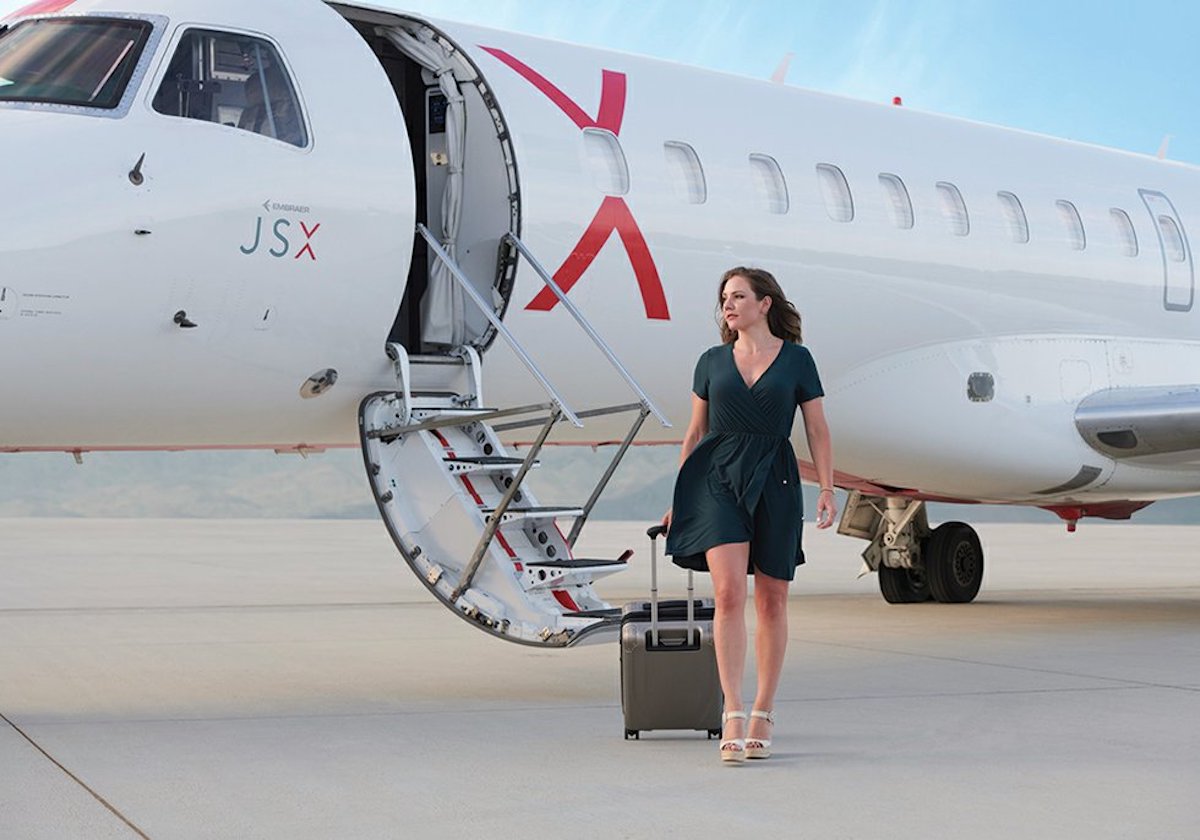
There has been a lot of discussion about whether JSX operates within the spirit or letter of the law, but I want to focus on one important point: innovation occurs via loopholes and legal gray areas and the JSX business model represents an important test case for the future of aviation in the USA.
JSX Represents The Type Of Aviation Innovation That Should Be Celebrated
View From The Wing and One Mile At A Time have gone back and forth on the issue of JSX this morning in a discussion that is quite interesting and serves as a helpful foundation for my focus below.
While most US carriers operate under 14 CFR Part 121 (a classification for regularly-scheduled air carriers), JSX (formerly known as Jet Suite X), operates under 14 CFR Part 135 (a classification primarily for commuter and on-demand operations).
This is what allows JSX to offer a quasi-private jet experience and use pilots older than 65 (who still must pass the same rigorous health requirements as their younger counterparts) or have flown less than 1,500 hours.
- On-demand operations can be conducted in airplanes that have a passenger seating configuration of 30 seats or less, a maximum payload capacity of 7500 pounds, or in any rotorcraft.
- On-demand certificate holders can also conduct limited scheduled operations with the following additional restrictions:
- Commuter operations may be conducted in airplanes which have a maximum passenger-seating configuration of 9 seats and a maximum payload capacity of 7500 pounds, or in any rotorcraft. Commuter operations cannot be conducted in any turbo-jet aircraft.
(14 CFR 135)
JSX operates a fleet of ERJ-135/145 jets with 30 seats onboard, but appears to operate scheduled service between several cities. How is this possible?
Through a legal loophole–and yes, it is prima facie legal and does appear to be a loophole–by operating under two companies (not that a customer would really ever know). One company sells tickets (JetSuiteX, Inc.) while another (Delux Public Charter, LLC dba JSX Air or Taos Air) operates charter flights on behalf of the ticket seller via 14 CFR Part 380 (a classification for charter operators).
So JSX, a Part 135 carrier does not operate the flights. Instead, it JSX Air, a Part 380 carrier, which has allowed JSX to overcome rules which suggest its scheduled operations should not be on aircraft that have more than nine seats.
ALPA Opposes JSX
This legal theory has not been tested, but is now…as the Air Line Pilots Association (ALPA), a union representing commercial pilots at several airlines, is placing the spotlight on JSX to argue that it should be banned.
Since JSX does in fact provide scheduled service, it should be deemed to do so, regardless of the fictitious regulatory disguise that it dons. JSX unequivocally holds out to the public scheduled service with advertisements such as: ‘Schedule extended! Book our flights through March 2024’ and ‘Hop on: our schedule is now available for purchase through March 2024.’
JSX’s public advertising to consumers belies its filing. JSX’s legal position is that if it were not for the FAA’s carveout, JSX’s flights…would be unquestionably and legally ‘scheduled.’ To the consumer, unaware of fine-line regulatory distinctions or even the fine print buried in JSX’s advertisements, JSX’s flights are scheduled – just like its Part 121 competitors.
Using this loophole to swap “scheduled” for “charter” and thereby trade the highest standard of safety for a lesser one is an abuse of the public trust that must be corrected in the public interest.
The context of this move is that SkyWest is considering a similar business model on some Essential Air Service routes that cannot support sufficient traffic to justify a 50-seat jet. The union has an interest in keeping it hard to become a pilot and deems a hazard potential lower wages if these new initiatives begin to proliferate.
Does JSX Operate In Legal Gray Area? Sure. Let’s Clarify It Now.
So here’s where I stand. I agree with Ben that JSX is operating outside the sprit of the law. But I agree with Gary that this stretching of the law should be celebrated, encouraged, and ultimately protected because JSX is good for consumers. I agree with both that the minimum 1,500-hour pilot rule requires revision and will pointedly add that JSX pilots are not simply young kids with no experience, but often former commercial airline senior captains who are sharp and healthy, but have been forced out by the mandatory retirement age of 65 for pilots, regardless of their mental and physical health.
As much as I find the ALPA position to be wholly self-serving, anti-consumer, and even anti-safety, I do think it has a point that JSX is not operating as intended by regulators. The key now is for regulators…or Congress…to clarify this matter in a way that protects JSX (better than a court doing so).
Ben is concerned about the safety of other would-be competitors of JSX. I see that as a parallel issue that the Federal Aviation Administration must closely monitor, but separate from the idea that JSX is attempting to innovate (like Uber, for example) in a legal gray area and should be supported, not cut off.
CONCLUSION
JSX is stretching the bounds of regulatory language in part to show where it falls short of consumer and safety needs. It is not surprising that a union vested in protecting the status quo opposes such a move, but we must see it for what it is: purely self-serving to protect an entrenched interest. The ALPA position does not holistically benefit consumers if it results in less (still heavily regulated) air service and pushes more people to roads and highways.
So I agree with Ben…and Gary. I love the concept of JSX and want it to thrive. Ideally, I would love if regulators made explicit that its business model is permissible. But its current operations demonstrate that it is a filling an important gap in the market and should be celebrated, not viewed (speciously) as unsafe.
image: JSX




Ben is whiny. Just because something is against the “spirit” of the law, doesn’t make it illegal. They found a loophole, plain and simple. This is just to force people onto legacy carriers that refuse to innovate for their customers. Unless innovate is finding a private jet home as the ceo of a public airline.
Ben’s credit card use also contradicts his outrage with JSX. Having so many credit cards and exploiting the fine print to get the bonuses is not in the spirit of normal use. However, Ben may not be normal, haha
Thanks for ghost editing my comment, Matt. He is a whiny b, as I stated. He was too big of a tool to actually defend us during covid karenism. Same with you for denying those of us have a medical issue.
Don’t curse. I don’t censor ideas, only profanity.
And I don’t believe in medical conditions that prevent wearing a mask beyond snowflakitis. I’d have so much more respect if you simply said there is no logic behind mask mandates and that you were engaging in civil disobedience.
>And I don’t believe in medical conditions that prevent wearing a mask beyond snowflakitis.
Said the man promoting disordered eating behaviors in his blog posts, but go on …
He is incapable of reasonable thought at this point. To him, just like some of the other “snowflakes” (his word, not mine) he thinks I’m a “Trumper” and can’t see beyond his own biases. God forbid he ever have to deal asthma like mine….. Again, likely to be “moderated”
First it was “don’t use the f word, now the goal posts have moved.
Mr Klint great piece on how business should work, I support any airline of this type and will fly on them first choice. I like the business model, it gives you the spirit of freedom where aviation began. Aviation has been a little stale the pastfew years and could use a boost of fresh air. I enjoy your articles and godspeed friend.
“The key now is for regulators…or Congress…to clarify this matter in a way that protects JSX (better than a court doing so).”
Regulators have been clear that this is legal. EVEN ALPA SAYS IT IS LEGAL in their filing, they just want the law changed.
And there’s no reason to suspect JSX’s standing would be litigated, and besides if it were wouldn’t the courts look to the agency’s judgment on the matter (Chevron deference)?
There’s too much ‘on the one hand, on the other hand’ – sometimes one side really is right, and the other really is wrong. JSX is legal. There’s no actual suggestion of safety issues. ALPA is engaged in a naked play to block a model that doesn’t just appeal to customers (peeling them away from flights on planes operated by their members) but also serves as a training ground for co-pilots to rack up hours, increasing the supply for commercial pilots.
I agree (and said) that it is legal…until it is not.
Sort of like the recent Biden v. Nebraska case, right? It seemed clever and “legal” that the HEROES Act gave the Secretary of Education authority to “waive or modify any statutory or regulatory provision applicable to the student financial assistance programs under title IV of the [Education Act] as the Secretary deems necessary in connection with a war or other military operation or national emergency,” but the SCOTUS majority said no, that’s really not what was intended by the act.
Regulators have not stopped JSX from operating, but have not affirmatively endorsed its business model.
I’d like regulators or Congress to do so.
We agree on the games ALPA is playing.
Not at all like that. Nobody believed the HEROES Act gave the Biden Administration the authority to forgive student loans in the manner it was doing. They just bet that nobody would be found to have standing to challenge it. And the Supreme Court isn’t going to grant Chevron Deference when it runs afoul of its Major Questions Doctrine jurisprudence either.
Coming up with a tortured interpretation of the HEROES Act to spend $400 billion is entirely different than deferring to an agency where JSX follows the text of relevant regulations to the letter.
Even ALPA doesn’t think there’s legal ground to challenge whether JSX complies with current rules. They just want those rules changed to block JSX’s business model.
Don’t you think JSX’s operations represent an absolutely tortured application of Part 135?
It’s clever…I love it…I want it to succeed…but can’t you acknowledge that JSX is essentially operating scheduled service through a clever legal arrangement that brazenly circumvents the intent of the regulatory framework?
Put another way, it seems clear to me that regulators did not intend to permit de facto scheduled service on a 30-seat jet with pilots either above the age of 65 and/or with under 1,500 hours of flight time.
I remain sympathetic to JSX and wholly unsympathetic to ALPA’s duplicitous advocacy, but I think we can still admit that 1.) JSX is gaming the system and 2.) the lack of enforcement action against that does not necessarily indicate approval.
“Don’t you think JSX’s operations represent an absolutely tortured application of Part 135?”
It is not at all tortured, it is consistent with a plain reading of the regs.
“it seems clear to me that regulators did not intend to permit de facto scheduled service on a 30-seat jet with pilots either above the age of 65 and/or with under 1,500 hours of flight time.”
On the contrary, regulators have expressly approved and permit (and therefore intended to permit) the JSX business model.
There is no tricking of the FAA or sliding by going on here. They went to the FAA. They got the FAA’s blessing. The FAA continues to audit their operations.
I think what you are saying is ‘the original authors of what’s codified 14 CFR § 135 (and the Federal Aviation Regulations (FAR), of which 14 CFR is a part, was first codified in the 1950s and 1960s) didn’t think of JSX when the rules were written but that’s true of most every rule, and also not especially relevant.
There’s been no compelling reason to update the rules of Part 135, certainly not in the ALPA filing to DOT in an unrelated matter.
I suppose we’ll have to agree to disagree that JSX’s actions are consistent with a plain reading of the regs.
JSX and its shell company have been given operating licenses, but it isn’t clear to me that regulators knew what they were up to. Certainly, the FAA is going to audit their operations for safety, as it would every 135 operator.
And I don’t mean that authors of 135 did not specifically envision JSX, but rather that they did not envision any 135 operator using two companies and a “charter” operation to run what amounts to scheduled service beyond nine seats or five weekly durations.
I hope you appreciate this is all technical – I think the important thing is that you and I both wish the JSX business model success and recognize the true motives of ALPA.
Replied to the wrong response earlier, apologies.
“it isn’t clear to me that regulators knew what they were up to.”
They literally had to have multiple meetings with FAA to lay it out.
This is exactly what I’ve been saying… Their FAA inspectors know exactly what JSX is doing. They’re not doing anything illegal. While it might not have been the original intent of the regs to allow the JSX business model to happen, the loopholes do exist nonetheless. It’s similar to when the fractionals gained popularity. Clearly the regs didn’t anticipate something of that sort happening. Once it did, the result was new regulations to support a new type of innovation. I expect it will wind up the same for JSX. At least I hope so.
This service is an asset to the American traveler. I knew that the larger carriers would throw a fit. Don’t ruin a good thing.
“it isn’t clear to me that regulators knew what they were up to.”
They literally had to have multiple meetings with FAA to lay it out.
The FAA is too busy harassing model aircraft pilots to look after real airplanes.
Matthew, I am not sure if you follow Noel Phillips (another travel vlogger) on YouTube, but he and his wife used JSX to fly from Vegas back to Houston after she had to have emergency surgery during their vacation. IMO. a much easier flight for her on a 30-seat aircraft than one carrying 200+ passengers and avoiding the hustle/bustle of an airport terminal.
Have not seen it, but JSX has a big operation at BUR, just 15 minutes away from me, and I do hope to try it and review it one day. In fact, I was offered a comp trip a while back, but turned it down. I turn down almost every media trip since it becomes so difficult to avoid bias.
WE love JSX and hope the Union does not mess it up for all of us!! Sounds like too many lawyers are involve in above
discussions???
Isn’t a good chunk of the points game based on exploiting loopholes and “operating outside the spirit of the law”?
MS yes, which I’ve never done, but I’m not sure about the “mainstream” points game. Perhaps exploring loose routing rules back in the day…but that has been a decade since those rules were tightened.
Depends on what is considered “mainstream”. As an example, people purposefully selecting flights not to fly but with the hopes that the flight will be delayed/cancelled/asked by the airlines to take a different flight in order to get compensation from the airlines…or even things like credit card churning…
I feel the snag will be the “scheduled” service, raising the bar and putting itself in harms way. If it was consistent at 8 PAX and reduced weight, they have a chance. But once you record more than eight on ANY flight, the rules change, no matter who sold the ticket and who provided the service.
Because it deals with aviation (federal domaine), it will go thru district court, then court of appeals (ie: AA & B6 & NEA). Don’t be surprised if it goes to SCOTUS.
The only ones who benefit from this wrangling are the lawyers and billable hours!!
I just wish JSX would offer flights to somewhere better than DAL out of AUS. I know Gary loves it, but AA’s literal 15 flights a day to DFW render JSX useless to me.
The Big3 are just jealous they can’t match the experience that JSX delivers.
I wish they flew more places, I love flying them, and 100% worth the premium.
See the Airline Safety Act of 2010. Welcome to the safest decade in aviation history as a consequence of it, especially as it relates to upset recovery training and pilot qualifications. Please take into consideration the families of the Colgan crash and many others like it before that when writing a piece like this. Scaling back after an unequivocal statistical success seems very ill advised. Pilots are less experienced as a whole now more than ever, we need to keep the bar high so that it does not devolve to include unqualified individuals.